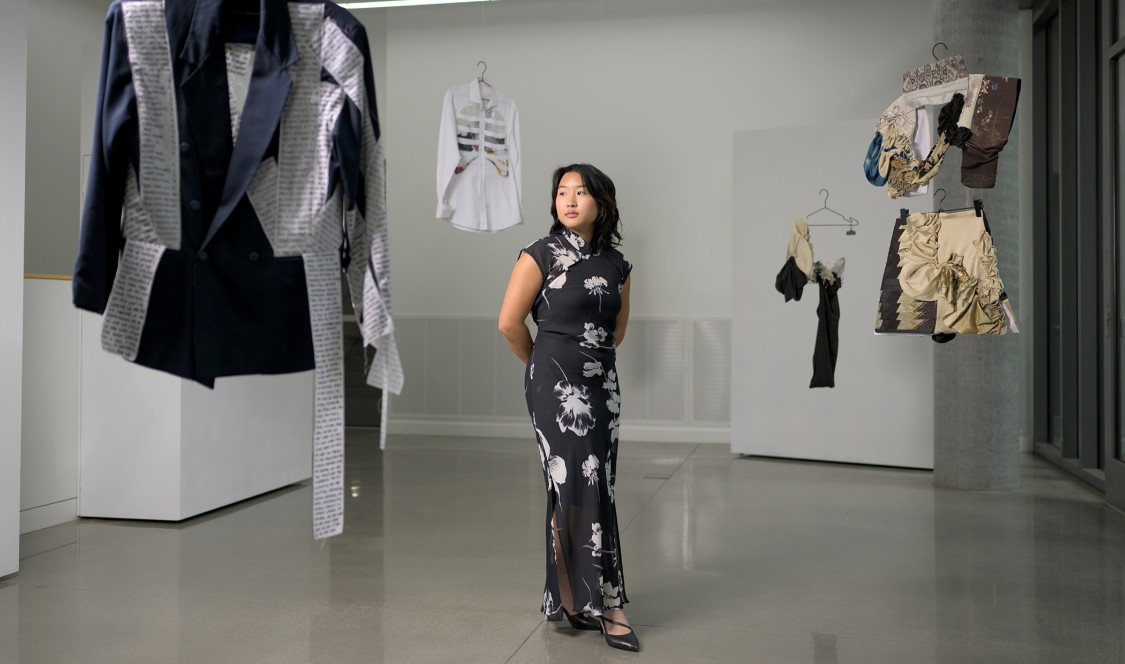When Cayman Chen ’25 set out to learn about how the fashion industry might become more sustainable, she expected to find that innovation––new fabrics, techniques, or ways of textile recycling––would be the solution. Instead, she learned that looking backward offered some novel ideas.
“I had never thought of looking to the past to solve our modern environmental issues, and it seems that mainstream sustainability initiatives have largely overlooked this option as well,” she explained.
Chen was one of 24 CMC students chosen to receive a coveted Appel Fellowship in 2022. Given to a select group of first-year students through the Center for Writing and Public Discourse, the summer fellowship funds “support purposeful, independent experiences that culminate in a meaningful and substantial writing project.” It’s meant to be largely unstructured and self-designed, and Chen knew she wanted to travel, write, and sketch her project––zeroing in on “fast fashion.”

“Our entire society has been deceived by modern consumerism and the belief that self-worth and happiness are attached to material goods. The fashion industry is particularly notorious for perpetuating this mindset and producing tremendous waste from both the manufacturing process and post-consumption disposal,” Chen wrote in her proposal.
Long interested in becoming a fashion designer and having sewed her own clothes since childhood, she hoped to square her interest in clothing with a sustainable approach.
Chen researched, identified, and then reached out to designers and artisans whose work she admired in Singapore and Japan, and to her delight, nearly all agreed to meet with her.
“I cold emailed all of them,” she explained, “so it was a bit of a leap.”
After sketching out an itinerary, she made her plan for the summer, her Appel funding covering the expenses of an ambitious trip. It also covered the cost of translators for some of the interviewees who did not speak English, though Google translate helped too. Armed with her journal and collecting fabrics as she went, Chen made her way across both countries for her inquiry.
Among others, she interviewed a natural dyes artisan, a kimono artisan, and several sustainable fashion designers.
In Tokyo, she spoke with Aaron Benjamin Mullin about the core values of his kimono company: “kindness to the environment, laborers, and employees, and to culture.”
In Singapore, Ferzin Patel of Canvas and Weaves told Chen that “heritage craft itself is sustainable” and reminded her to pay attention to “sourcing and materials, timelessness, and knowing where your product will end up.”
Also in Singapore, Chen met with Justine Boquiren of Wray Crafted, which relies on artisans––mostly women–– to sew its designs and practices ethical labor strategies.

Chen’s notetaking process was novel. Instead of simply recording the interviews, she sketched graphic notes and drawings in her journal as a means of fulfilling the writing requirement of the fellowship.
"Writing is a crucial component of the Appel Fellowship, and Cayman's project exemplifies why," said Chloe Martinez, program coordinator at the Center for Writing and Public Discourse and faculty coordinator of the Appel Fellowship. "When we look at a beautiful, finished project, the work that went into it isn't always apparent, but Cayman's journal lets viewers into her deeply engaged and creative process."
As she sketched her notes and drawings during her interviews with designers, Chen came to understand the importance of looking backward.
“What I learned is that traditional arts and crafts is inherently sustainable. Using natural dyes and slower, manual processes gets away from mass production, which is one of the most destructive aspects of the fashion industry.”
The business owners also shared their strategies for putting workers front and center in business decisions, an additional form of sustainability.

As she traveled, Chen began making plans for a new clothing collection that would incorporate her findings. She also took fabric souvenirs––some were gifts from her interviewees, so in addition to a lot of inspiration, she ended up with some extra weight.
“I had to get a little creative with my suitcase,” Chen explained.
Back in the States, she started assembling her pieces, showing them at an exhibit at Harvey Mudd’s Sprague Gallery in December and again during CMC’s Family Weekend in March as part of a showcase of Appel Fellows’ work at the Athenaeum.
Both shows enabled her to connect with an audience beyond the clothing she presented. For her previous shows, Chen observed, audience members were able to appreciate the visual component of her work, but she didn’t get an opportunity to explain the conceptual component.
“That's one of the reasons why these two shows have been really gratifying––because I have been able to truly share my new knowledge with people in hopes that they will learn something new too,” she said.
Chen has always approached fashion from the artistic side but is committed to her academic pursuits too––as a psychology major, she sees plenty of overlap between the two.
“I’m already planning my senior thesis,” Chen said. “I hope to merge my two interests.”
View more of Cayman's work here.
Experiences like Cayman’s are made possible due to donors like you. Your gift — no matter the amount — ensures that the future promise of CMC is made real for today’s and tomorrow’s students. Join us!
Make your gift by June 30 to ensure you’re included in the historic Campaign for CMC: Responsible Leadership. Please visit the campaign site by clicking here.

